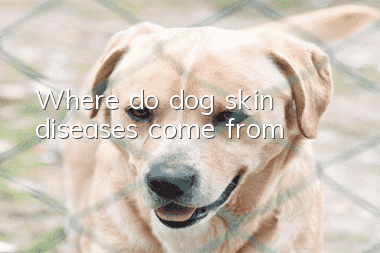Where do dog skin diseases come from?

Dog skin diseases are mainly caused by infection with fungi, bacteria, parasites, and allergies. If the dog is not bathed and dewormed regularly or the dog's hair is not dried in time after bathing, it is easy to contract skin diseases. Secondly, if the dog stays in a humid place for a long time, has a dirty living environment, has an unbalanced diet, and likes to play with stray dogs when going out, it will also be easy to contract skin diseases. Therefore, once you find that your dog has large areas of hair loss, red and swollen skin, pimples, scabs and other symptoms, you need to go to the hospital for diagnosis and treatment in time.
When a dog suffers from a skin disease, you cannot blindly use medication to treat it. You need to first analyze the specific cause of the dog's skin disease and then choose targeted medication for treatment.
1. Caused by fungal infection
When dogs are infected with fungi, they usually experience hair loss, itching, scabs, dander, local papules, pustules, scabs, or frequent scratching. and other symptoms. In terms of treatment, anti-inflammatory antibacterial and antifungal drugs containing terbinafine are mainly used for treatment. In addition, the dog needs to be supplemented with vitamin B and taken to bask in the sun, which will help the dog recover faster.
Generally, it takes about 14 days to treat mild skin diseases. If the disease is more serious, the treatment time will be longer. During the treatment period, the dog needs to be given medication on time to prevent the dog from developing drug resistance.
2. Caused by bacterial infection
Bacterial infection usually causes the affected part of the dog to appear red, swollen, hot, and painful. In severe cases, it may cause hair loss in patches. The skin may also become red and hot, sometimes in the form of red circles. When you find that your dog has the above symptoms, you need to go to the pet hospital for examination and treatment as soon as possible to determine which bacterial infection is causing it, and then treat the cause.
3. Caused by parasites
When dogs are infected with parasites, the main clinical symptoms include itching, skin redness and swelling, sebaceous gland exudation, hair loss, and increased dandruff. In severe cases, dogs Dogs may also suffer from hair loss all over the body and be weak and anemic. In addition, parasites can also absorb the dog's nutrients, causing the dog to become emaciated or dehydrated. At this time, in addition to taking medicine and applying medicine, you can also give the dog nutritional injections to supplement nutrition and enhance the dog's resistance.
4. Caused by allergies
Dog allergies can cause itching all over the body, red bumps and erythema-like hard lumps on the skin. It is also accompanied by itching and hair loss. When a dog is allergic, it needs to be taken to the pet hospital for anti-allergy injections in time, and then treated accordingly according to the corresponding symptoms. At the same time, owners need to pay attention to what their dogs are allergic to to prevent allergies from occurring again next time. Secondly, you can also give some to the dogHypoallergenic prescription food, long-term consumption cannot be interrupted, and it is also better for dogs’ skin.
Note: If a dog suffers from a skin disease, the dog cannot be licked, otherwise it will accelerate the spread of the skin disease. There are also a large number of bacteria in the dog's mouth, which will aggravate the dog's illness and slow down the recovery of the disease. Therefore, it is recommended that owners wear an Elizabethan collar on their dog after it suffers from skin diseases. You should also pay attention to regular internal and external deworming of dogs, regularly use special shampoo to bathe dogs, comb their hair, keep them clean and hygienic, and regularly disinfect and disinfect the dog’s living environment, which can effectively prevent dogs from skin infections. sick.
- How to train a female Staffordshire Terrier? How to make a female Staffordshire Terrier obedient?
- Can pet dogs not be vaccinated?
- What are the symptoms of excessive calcium supplementation in golden retrievers?
- Why do dogs love to eat paper? Why do dogs love to eat paper?
- How to feed and care for Chihuahuas in summer?
- Dog vomiting and diarrhea
- Do dogs need shoes?
- How to deal with skin diseases in French cattle dogs
- Will an adopted pug recognize its new owner?
- Is the mortality rate of dog gastroenteritis high?



